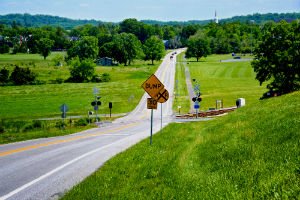 On Monday, a 29-year-old Pennsylvania woman was killed when her car collided with a train traveling at 45 miles per hour at the railroad crossing at the 12000 Block of North River Road in Halifax Township.
On Monday, a 29-year-old Pennsylvania woman was killed when her car collided with a train traveling at 45 miles per hour at the railroad crossing at the 12000 Block of North River Road in Halifax Township.
Two other car wrecks were reported at the same location in 1994 and 2003 but no one was injured, according to the Federal Railroad Administration.
Two railway experts have deemed the crossing “seriously deficient” since drivers must see an oncoming train prior to stopping. However, there is limited visibility at the crossing due to trees and brush, and by the time drivers can see if a train is coming they may not have enough time to stop.
The crossing also does not have gates, lights or signage directing drivers to stop or yield to oncoming trains, despite nationally recommended standards.
To make matters worse, Pennsylvania law does not mandate that drivers stop at all railroad crossings. Drivers are only required to stop for gates that are lowered, flashing lights or visible oncoming trains.
If there is less sight distance at a railroad crossing, it should be mitigated by a stop sign, lights or gates to prevent accidents, according to Gus Ubaldi, a railroad engineering expert from Robson Forensic.
Norfolk Southern is investigating the sight distance at the crossing, according to spokesman Dave Pidgeon.
He identified the Halifax crossing as a public crossing when asked about the lack of signage in the area, implying the state is responsible for signage.
However, the crossing is listed as a private crossing which means that the railroad, and not the state, is responsible for signs and safety notices.
If your loved one has been injured or killed in a car accident due to negligence, speak to a skilled and compassionate car accident lawyer at the law firm of Schmidt Kramer. Our Pennsylvania attorneys will aggressively pursue maximum compensation for your injuries and other damages.
Call us today at (717) 888-8888 or complete a Free Case Evaluation form.

